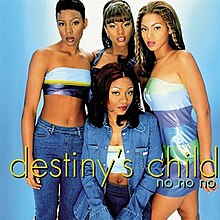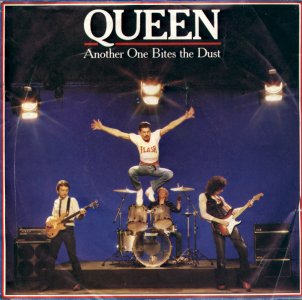
"Another One Bites the Dust" is a song by the British rock band Queen. Written by bassist John Deacon, the song was featured on the group's eighth studio album The Game (1980). It was a worldwide hit, charting at number one on the US Billboard Hot 100 for three weeks, from 4 October to 18 October. The song spent 15 weeks in the Billboard top 10, including 13 weeks in the top five, and 31 weeks total on the chart. It reached number two on the Hot Soul Singles chart and the Disco Top 100 chart, and number seven on the UK Singles Chart. The song is credited as Queen's best-selling single, with sales of over 7 million copies. This version was ranked at number 34 on Billboard's All-Time Top Songs.
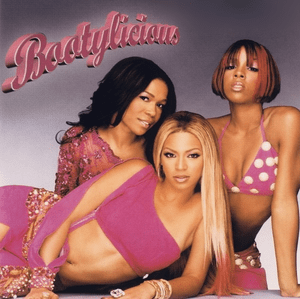
"Bootylicious" is a song recorded by American group Destiny's Child for their third studio album Survivor (2001). It was written and produced by Rob Fusari, Beyoncé and Falonte Moore. The song contains a prominent sample from Stevie Nicks' song "Edge of Seventeen". It was released as the second single from Survivor on May 22, 2001, by Columbia Records.

"Independent Women Part I" is a song recorded by American group Destiny's Child for the soundtrack to the film adaptation of the 1970s television series Charlie's Angels. It was written and produced by production duo Poke & Tone, consisting of Samuel Barnes and Jean-Claude Olivier, along with Cory Rooney, and group member Beyoncé Knowles. The song was later included on the group's third studio album Survivor (2001). "Independent Women" was Destiny's Child's first single to feature vocals from group member Michelle Williams and the only single to feature Farrah Franklin, who was no longer in the group when the single was released.

"Lady Marmalade" is a song written by Bob Crewe and Kenny Nolan, originally for Nolan's disco group the Eleventh Hour. The song is famous for the repeated refrain of "Voulez-vous coucher avec moi?" in French as part of the chorus, a sexually suggestive line that translates into English as: "Do you want to sleep with me?" The song first became a popular hit when it was recorded in 1974 by the American funk rock group Labelle and held the number-one spot on the Billboard Hot 100 chart for one week, and also topped the Canadian RPM national singles chart. In 2021, the Library of Congress selected Labelle's version for preservation in the National Recording Registry for being "culturally, historically, or artistically significant".

"Ghetto Supastar (That Is What You Are)" is a song by American rapper Pras, featuring rapper Ol' Dirty Bastard and R&B singer Mýa. Produced by Pras and Wyclef Jean, with co-production from Jerry 'Wonda" Duplessis and Che Pope, it interpolates Kenny Rogers and Dolly Parton's 1983 single "Islands in the Stream" as written by the Bee Gees. Also featured on the soundtrack for the 1998 film Bulworth, the song was released as Pras' debut solo single and the second from his debut solo album Ghetto Supastar on June 6, 1998.
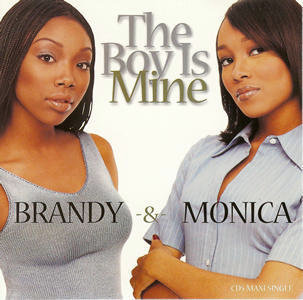
"The Boy Is Mine" is a duet by American singers Brandy and Monica. It was written by LaShawn Daniels, Japhe Tejeda, Fred Jerkins III, Rodney "Darkchild" Jerkins, and Brandy, while production was helmed by Jerkins, Brandy, and Dallas Austin. It was released as the lead single from both singers' second albums from 1998, Never Say Never by Brandy and the album of the same name by Monica. Inspired by Michael Jackson and Paul McCartney's 1982 duet "The Girl Is Mine", the lyrics of the mid-tempo R&B track revolve around two women fighting over a man.

"Jumpin', Jumpin' " is a song by American group Destiny's Child for their second studio album, The Writing's on the Wall (1999). The song was co-written and co-produced by group member Beyoncé Knowles and Chad Elliott, with additional writing from Rufus Moore and production assistance from Jovonn Alexander. It was released as the fourth and final single from The Writing's on the Wall on July 14, 2000, by Columbia Records.

"Survivor" is a song recorded by American group Destiny's Child for their third studio album of the same title (2001). It was written and composed by group member Beyoncé, Anthony Dent, and Mathew Knowles. "Survivor" was inspired by a joke that a radio station had made about the fact that three members had already left the group, comparing the band to the reality game show Survivor. Beyoncé was inspired to take the negative comment and turn it into a positive by writing a song out of it. The song was released as the lead single from Survivor on March 6, 2001, by Columbia Records. It marked the first single released by the trio of Beyoncé, Kelly Rowland, and Michelle Williams.

"Say My Name" is a song by American group Destiny's Child from their second studio album, The Writing's on the Wall (1999). It was written by Beyoncé Knowles, LeToya Luckett, LaTavia Roberson, Kelly Rowland, LaShawn Daniels, Fred Jerkins III, and Rodney Jerkins, featuring production by the latter. While the song and single artwork features the group's original line-up consisting of Luckett and Roberson, the music video for the single marked the introduction of the group's second line-up with replacement members Michelle Williams and Farrah Franklin. "Say My Name" was released as the third single from The Writing's on the Wall on October 14, 1999, by Columbia Records.

"Emotion" is a song written by Barry and Robin Gibb. It was first recorded by Australian singer Samantha Sang, whose version reached number three on the Billboard Hot 100 chart in 1978. The Bee Gees recorded their own version of the song in 1994 as part of an album called Love Songs, which was never released, but it was eventually included on their 2001 collection titled Their Greatest Hits: The Record. In 2001, "Emotion" was covered by the American R&B girl group Destiny's Child. Their version of the song was an international hit, reaching the top ten on the US Hot 100 chart and peaking in the top five on the UK Singles Chart. English singer Emma Bunton also covered the song on her 2019 album My Happy Place.
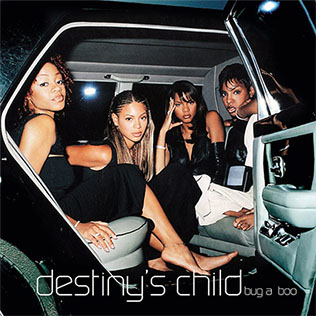
"Bug a Boo" is a song recorded by American group Destiny's Child for their second studio album The Writing's on the Wall (1999). It was written by group members Beyoncé Knowles, LeToya Luckett, LaTavia Roberson and Kelly Rowland along with Kandi Burruss and Kevin "She'kspere" Briggs, featuring production by the latter. The song uses interpolations of the 1978 song "Child's Anthem" by Toto.

"Bills, Bills, Bills" is a song by American girl group Destiny's Child from their second studio album, The Writing's on the Wall (1999). It was written by Beyoncé Knowles, LeToya Luckett, Kelly Rowland, Kandi Burruss, and Kevin "She'kspere" Briggs and produced by the latter. The song was released as the lead single from The Writing's on the Wall on May 31, 1999, by Columbia Records.
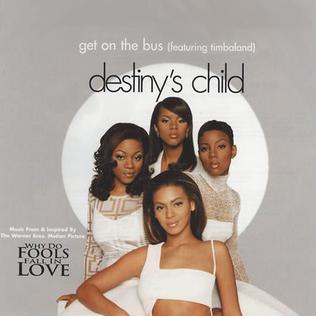
"Get on the Bus" is a song recorded by American group Destiny's Child, featuring musician Timbaland, for the original motion picture soundtrack of Gregory Nava's romantic drama Why Do Fools Fall in Love (1998). It was written and produced by Timbaland and Missy Elliott. As with other Timbaland's 1990s productions, the song features some unorthodox elements, including bird sounds. It was released as the second single from Why Do Fools Fall in Love on September 21, 1998 by Columbia Records and Elektra Records.

"With Me" is a song recorded by American group Destiny's Child for their eponymous debut studio album (1998). The song was produced by Jermaine Dupri and Manuel Seal Jr., and contains elements of Master P's song "Freak Hoes". According to the group, "With Me" was written as an answer song to Usher's "You Make Me Wanna...".

Destiny's Child is the debut studio album by American R&B group of the same name, released by 550 Music, Epic Records and Music World Entertainment on February 17, 1998. It features the singles "No, No, No" and "With Me", both of which preceded the album. "Killing Time" was also featured in "Men in Black: The Album" and released as a promotional single in 1997. Prior to release, the album was set to be called "Bridges". The album spent twenty six weeks on the US Billboard 200 chart and peaked at number sixty-seven. To date the album has sold a total of 831,000 copies in America. In the United Kingdom, it reached the top fifty, peaking at number forty-five. It was re-packaged and re-released in several countries after the success of the follow-up album, The Writing's on the Wall (1999). The album was met with generally favorable reviews from music critics, including AllMusic and Rolling Stone, and won a Soul Train Lady of Soul Award for Best R&B/Soul Album of the Year.

"Hips Don't Lie" is a song by Colombian singer-songwriter Shakira, featuring Haitian rapper Wyclef Jean, released by Epic Records in 2006 as the second single from Shakira's seventh studio album Oral Fixation, Vol. 2 (2005). Shakira and Jean wrote the lyrics and jointly composed the music with additional co-writing by Shakira's percussionist Archie Pena. The song was produced by Shakira and Jean with additional co-production by Jerry Duplessis. "Hips Don't Lie" is a reworking of Jean's earlier single "Dance Like This", therefore it features additional composing credits by Omar Alfanno, Duplessis, Luis Días, and LaTavia Parker. The song incorporates samples from "Amores Como el Nuestro" written by Alfanno, and "Carnaval " written by Días.

"God Bless the Child" is a song co-written and recorded by Canadian country music artist Shania Twain. It was released on October 26, 1996 as the eighth and final single from her sophomore studio album The Woman in Me (1995). The album version was solely written by Twain and the single version was co-written by Mutt Lange. The album version is more a poem than a song, completely done a cappella. A country version and an alternate version without the banjo were later released for airplay. "God Bless the Child" is one of Twain's few songs to have a major gospel music influence.
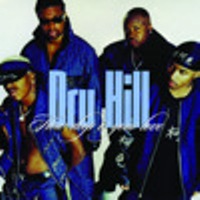
"How Deep Is Your Love" is an R&B single by group Dru Hill. It is the first single from the group's second album, Enter the Dru. The song was released on September 22, 1998. It spent three weeks at number-one on the US R&B chart, and peaked at number three on the US Billboard Hot 100 chart. The song, in its single version with rapper Redman, was also used in the end credits and is featured on the soundtrack to the 1998 film Rush Hour. To date, this is Dru Hill's highest-charting hit.

"Gone till November" a song by Haitian rapper Wyclef Jean, released as the third single from debut solo album, The Carnival (1997). The song was released on 25 November 1997 by Columbia and Ruffhouse, and peaked at number three on the UK Singles Chart, becoming Jean's highest-charting solo hit in the UK alongside 2000's "It Doesn't Matter". In the United States, the song peaked at number seven on the Billboard Hot 100 chart. It also reached number four in both Canada and New Zealand
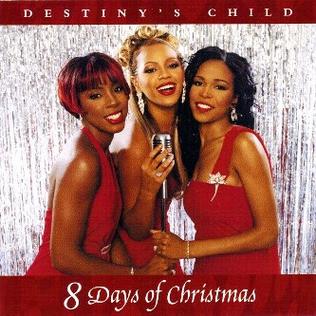
"8 Days of Christmas" is a song recorded by American girl group Destiny's Child for their Christmas album of the same title (2001). Written by group members Beyoncé and Kelly Rowland along with Errol McCalla Jr., who handled its production, it is a Christmas-themed song with heavy R&B and dance pop elements.
